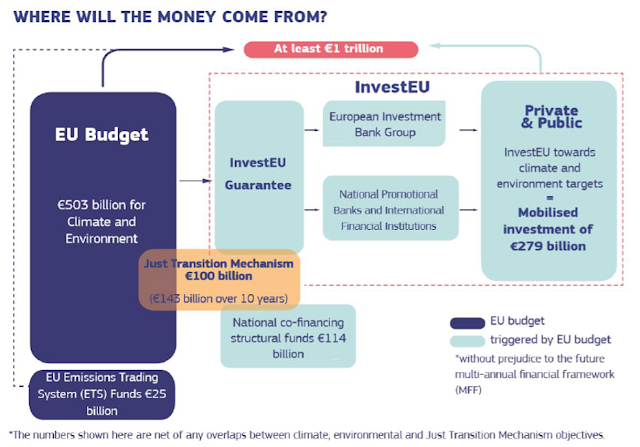
Today a new climate package has been released in Germany. In the build-up to the event all major politicians of the country called this the `make-or-break` point of German climate policy. For years Germany failed to meet its climate objectives and is sure to miss its greenhouse gas emission targets for 2020. Especially the transport and the heating sectors do not deliver. So which implementation measures to reach Germany`s climate goals are envisaged? And why took more than 1 million people in Germany to the streets (`climate strike`) in protest?
54 billion Euros until 2030 shall be paid out by the German government to ensure that the country reaches its climate targets of 40 % greenhouse gas reduction compared to 1990 levels in sectors covered by the European Emission Trading scheme (EU ETS) and 38 % reduction compared to 2005 levels in non-EU ETS sectors. These are namely transport and heating.
Today`s
climate package is a hotchpotch of several measures, which may be clustered into four points, discussed below, before the criticism of the package is being discussed:
The issue that has, arguably, been debated the most in the run-up to today`s decision was how exactly to clamp down on CO2 emissions. While the Social Democratic Party favored a CO2 tax, a lone-standing German emissions trading scheme is the favored idea of the Conservative Party. Both parties in government now opted to introduce a German ETS-system from 2021 onwards that shall cover transport and heating sectors. Certificates will, however, not be priced by the markets alone. Instead, a floor of 10 Euros per ton CO2 is set by the government, and this floor increases to 35 Euros per ton by 2026. Scientists, however, say that everything below a price of 50 Euros per ton is pointless. NGOs are even advocating a price-floor of 80 Euros. There will be no ceiling for the price per ton Co2. The expected result is an increase of gasoline prices at the pump between 3 and 4 cents by 2021 and the increase could reach 10 cents per liter of gasoline by 2026. The impact shall be eased by an increase of the commuting allowance.
The VAT on train tickets shall be halved, while the tax on plane tickets will double. With a view to alternative transport, the government pledges to have 1 million charging poles for electric vehicles up and running by 2030. To reach this aim a subsidy programme for erecting relevant infrastructure will be designed this year. With a view to heating, besides pledges to increase sector coupling and combined heat and power generation, there is little in the package. From 2026 onwards new oil-based heating systems in houses shall only be allowed in exceptional cases.
65 per cent of gross electricity consumption shall be produced from renewable sources by 2030. The issue of the energy transition slowing down in Germany shall be tackled in three ways. First, an existing cap for the building of new solar panels shall be lifted. Second, the aim of installed offshore wind capacity is raised to 20 Gigawatt by 2030. Third, the recent blockade of new onshore windmills via regional planning laws and NIMBYIsm, as discussed
earlier on this blog, shall be countered in two ways: one, the minimum distance between windmills and houses shall be reduced to a unified number of 1000 meters for all new windmills and for re-powering of old windmills. This, however, is subject to an opt-out option for Länder who wish to go below that number. Two, municipalities shall receive financial benefits when windmills are operating on their territory. There are no further details provided.
- Electricity Storage and Hydrogen Infrastructure
Electricity storage facilities will be defined in law as final consumers of electricity, which gives them a number of rights. Until now it was not clear whether future energy storage facilities are producers or consumers of electricity. Until the end of 2019 a `national hydrogen strategy´ shall be developed, but again, no further details are provided.
Criticism and Anger
While the climate package, which shall now be put into laws until the end of this year, was promulgated, more than 1 million people took to the streets in Germany to protest against the package in a day of `climate strike´. The package is under heavy criticism as `too little and much too late´. While the government pledged that the measures and their implementation would be closely monitored on a yearly basis, protesters, NGOs but also scientists and politicians are sceptical that no real system change is taking place. Subsidies for coal and gas remain largely untouched. For oil the system is inconsistent: while on the one hand subsides for oil remain in place, taxes on gasoline, on the other hand, shall increase, obscuring possible steering effects. Moreover, the fundamental decision to change the German renewable energy support system from a feed-in tariff model to a tendering model is not revised, despite mounting evidence that the tendering model is not working well. This is also due to European legislation, which pushed hard for the introduction of tenders for renewable energy subsidies in all Member States. But critics ponder that a major country like Germany should, nonetheless, be able to insist on the feed-in model. The climate package could, overall, be viewed as an abdication of Germany as world leader in climate policy.
 Today a new climate package has been released in Germany. In the build-up to the event all major politicians of the country called this the `make-or-break` point of German climate policy. For years Germany failed to meet its climate objectives and is sure to miss its greenhouse gas emission targets for 2020. Especially the transport and the heating sectors do not deliver. So which implementation measures to reach Germany`s climate goals are envisaged? And why took more than 1 million people in Germany to the streets (`climate strike`) in protest?
Today a new climate package has been released in Germany. In the build-up to the event all major politicians of the country called this the `make-or-break` point of German climate policy. For years Germany failed to meet its climate objectives and is sure to miss its greenhouse gas emission targets for 2020. Especially the transport and the heating sectors do not deliver. So which implementation measures to reach Germany`s climate goals are envisaged? And why took more than 1 million people in Germany to the streets (`climate strike`) in protest?


Comments
Post a Comment